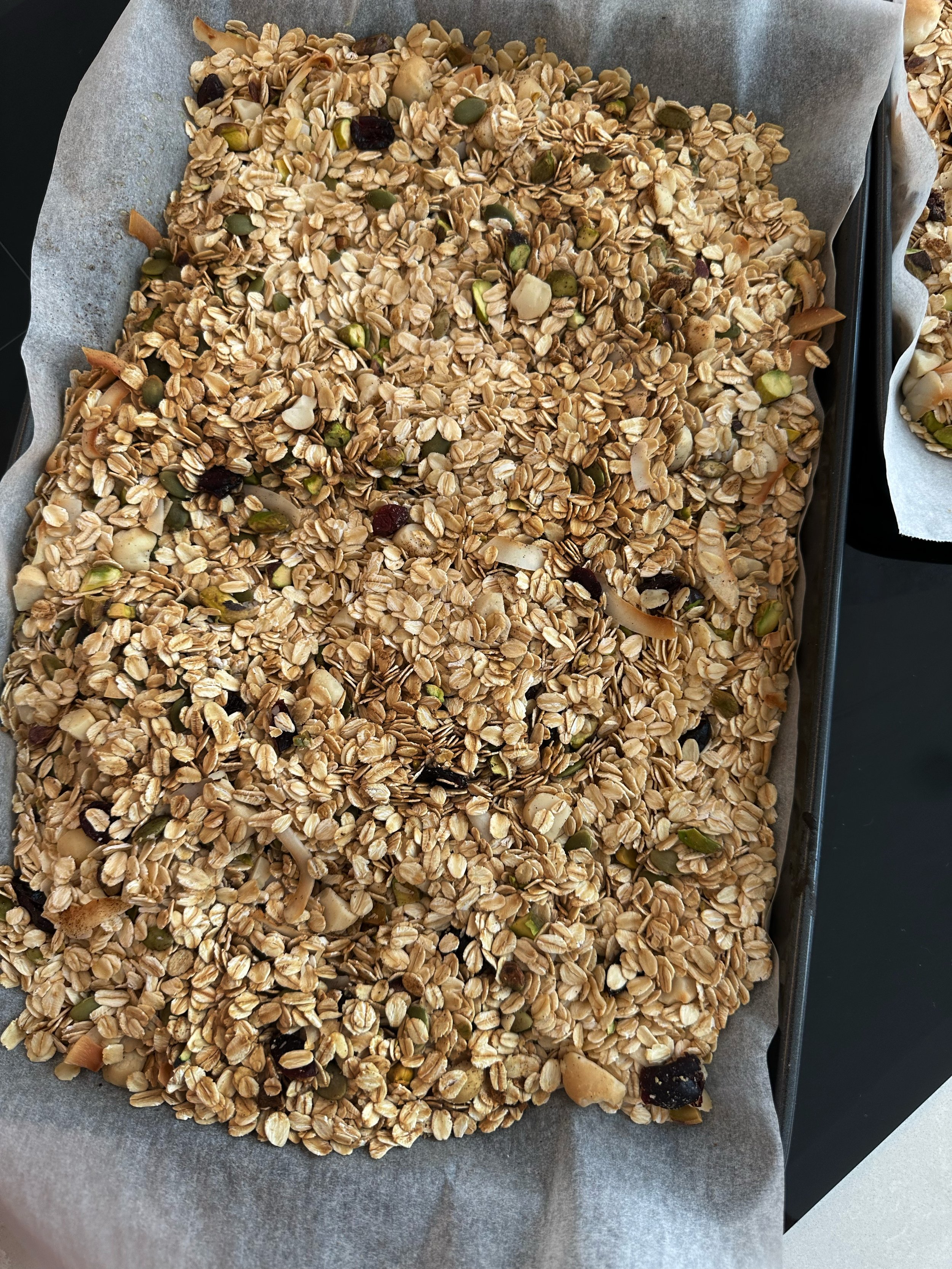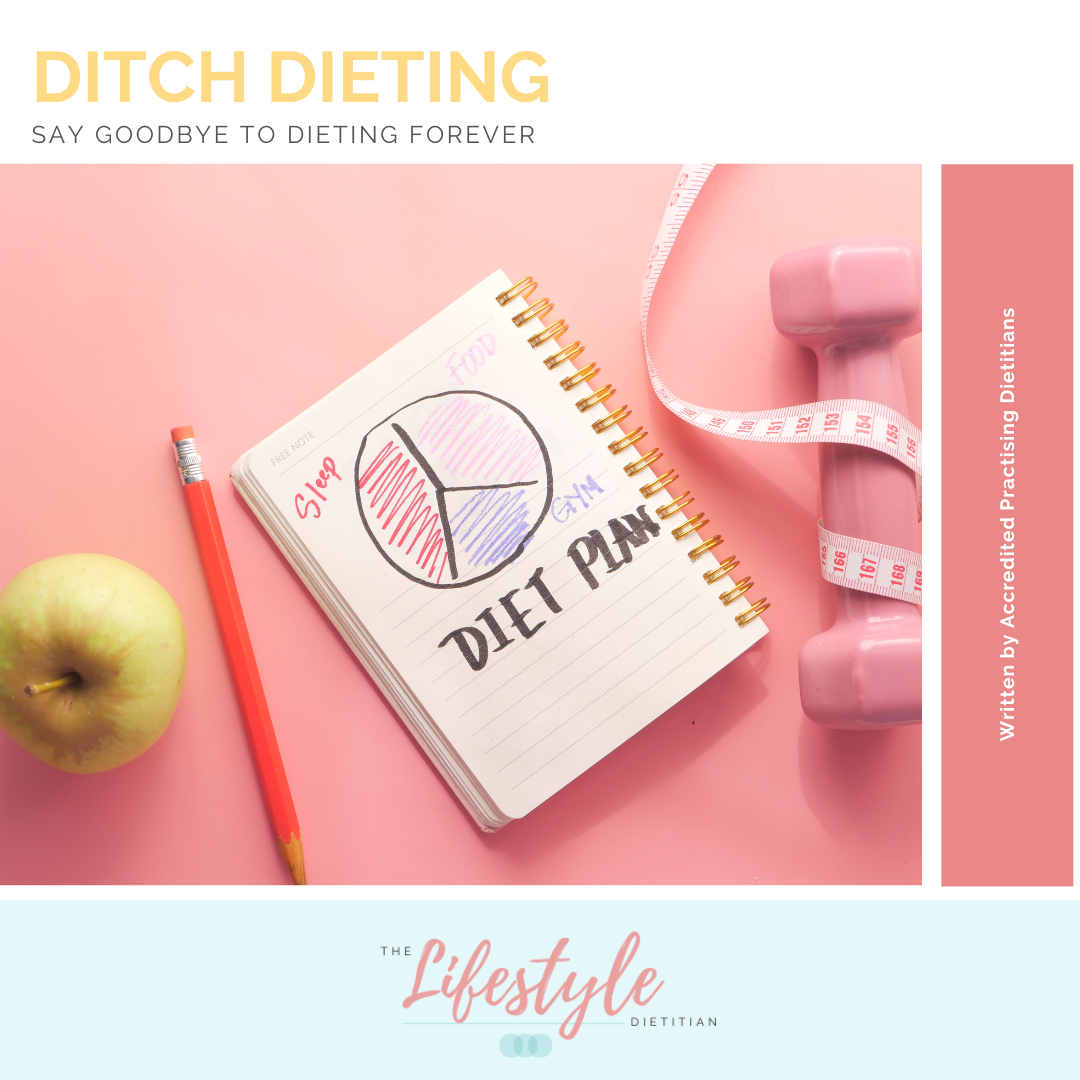Easy Homemade Christmas Muesli: A Nutritious Gift or Breakfast Idea
Wholesome, festive and perfect for celebrating the holiday season, our Christmas Muesli recipe is a wonderfully balanced breakfast (or Christmas gift!) to embrace the holiday spirit. We’ve packed in not just the usual mix of nuts, seeds, rolled oats and warming cinnamon, but also a dash of extra virgin olive oil. This adds a healthy dose of anti-inflammatory and prebiotic goodness, making this muesli not just delicious but also beneficial for PCOS, endometriosis, heart health, cholesterol management, insulin resistance and gut health. Pair with Greek yogurt, a splash of milk and your favourite festive fruit (dare we say mango?) for a complete, protein-packed meal. Whether you’re enjoying it for yourself, or giving it as a thoughtful, homemade Christmas gift, this recipe will bring joy and nourishment to your holiday table.

Serves 10 - 15
Ingredients
1 ½ cups rolled oats
¼ cup macadamia nuts
¼ cup pistachio nuts
¼ cup almonds
¼ cup pumpkin seeds
⅓ cup dried cranberries
⅓ cup dried strawberries
1 tablespoon maple syrup
1 tablespoon extra virgin olive oil
1 teaspoon cinnamon
Method
Preheat the oven to 180°C
Chop nuts into preferred size
Mix all ingredients in a large bowl
Spread evenly on a lined baking tray
Bake for 8 to 10 minutes, tossing halfway
Serve with yoghurt, milk, fruit and enjoy!
LOVED THIS RECIPE? THEN YOU WILL ENJOY THIS…

THE MEDITERRANEAN DIET EBOOK: BEGINNER'S GUIDE TO EATING MORE MEDITERRANEAN
Your one-stop guide to eating more Mediterranean. This ebook will leave you confident in taking the principles of the Med Diet and whisking, stirring, simmering them into meals that truly taste delicious.
Over 20 Dietitian-curated drool-worthy recipes, covering breakfast, lunch, dinner, dressings and snacks. Plus, a practical snack product guide with everyday eating tips and a weekly challenge list to tick off.
Like a cookbook but with a twist. Because each recipe, tip and suggestion is Dietitian-approved and tested.
HUNGRY FOR MORE? CHECK OUT OUR LIBRARY OF ARTICLES AND RECIPES WRITTEN BY OUR DIETITIANS:
Gut health plays a powerful role in managing endometriosis symptoms, especially through its impact on oestrogen levels, inflammation and digestion. The good news? It’s about adding in foods, not an extreme or restrictive diet. Here’s what the science says about the gut-endometriosis connection.
Have you been told to "just cut out salt" to lower your blood pressure, but feel like that is overwhelming and well… restrictive? Or, wish there was more to it than just avoiding salt? You're not alone. But here’s the good news: it is not just about what you take away, it’s also about what you add in. Foods rich in potassium, magnesium, calcium, nitrates and fibre can actively lower blood pressure. Read on to learn how and what foods you can focus on “crowding in”.
A lot of advice about reducing cholesterol focuses on what to cut out. But, that approach is demotivating, restrictive and… unsustainable. What if you focused on adding in foods instead? The great news is, consuming more of certain nutrients can lower cholesterol and make a meaningful difference. Let’s break down what those are and our top 15 foods to crowd into your diet.
“Fermented foods” are often called “probiotics”, but are they the same thing? Although both words are used interchangeably, turns out, this is a big misconception. Fermented foods are not all probiotics. Knowing the difference is important because whilst fermented foods and probiotics both contribute to gut health, they do so in different ways. Let’s break down what a true probiotic is, how it differs from fermented foods and what is best for your gut health.
Wholesome, festive and perfect for celebrating the holiday season, our Christmas Muesli recipe is a wonderfully balanced breakfast (or Christmas gift!) to embrace the holiday spirit. We’ve packed in not just the usual mix of nuts, seeds, rolled oats and warming cinnamon, but also a dash of extra virgin olive oil. This adds a healthy dose of anti-inflammatory and prebiotic goodness for your best health yet.
Scrambled, poached, sunny-side up and piled high on sourdough. Eggs are delicious. So, it can be jarring to think you need to give them up if you have high cholesterol. Some advice vilifies eggs, while other research says they’re fine. Cue feeling confused and stressed. Let’s separate the facts about eggs and cholesterol so you can sidestep unnecessary food restrictions and understand how eggs can be enjoyed without impacting your health.
Refreshing, creamy and nutrient-packed. This green smoothie blends spinach, banana, brazil nuts, milk, and chia seeds for a delicious treat. The key ingredient? Brazil nuts! They’re packed with selenium, a mineral that supports thyroid health and reduces inflammation, that’s a big tick for reaching your health goals with PCOS, endometriosis, fatty liver, fertility and insulin resistance.
Here’s a question we get asked all the time: “How can I enjoy occasional treats without negatively impacting PCOS or insulin levels and feeling guilty?” . While most “experts” agree high sugar treats aren’t “good” for PCOS and insulin resistance, completely avoiding them can turn into a classic restrict-overeat-repeat story. Instead, here are three ways to enjoy treats in a balanced way that still align with your PCOS and insulin resistance goals.
Picture this: the holidays are approaching, there’s festive excitement in the air. You’re looking forward to gatherings, delicious food, and reconnecting with loved ones. But alongside that joy, there’s a familiar worry creeping in - concerns about what you’ll eat, how you’ll look, and how to manage it all. There’s even the urge to go on a strict health reset come January. Sound familiar? You’re not alone. So instead of dreading the festivities, explore these five practical ways to navigate holiday eating with more peace, flexibility, and joy.
Ever looked in the mirror or scrolled through your camera roll feeling disheartened and frustrated about what you saw? That’s poor body image rearing its head. When body image struggles seep into daily decisions, it can lead to cycles of restriction, disappointment, and exhaustion. But, improving body image isn’t about flipping a switch to feel endlessly positive all the time. It’s about developing tools to approach your body with compassion and understanding, even on the tough days. Here are our top three first steps to take towards a better body image.
These Greek Chicken Souvlaki Pita Bowls combine lean protein, fibre, and anti-inflammatory herbs for a wholesome, balanced meal that supports gut health, PCOS, insulin resistance, and heart health. We included a delicious mix of textures — think crisp veggies, juicy marinated chicken, and creamy Greek yogurt-based tzatziki — to show you healthy eating can be delicious. Perfect for meal prep, this Mediterranean-inspired bowl is an easy, nutrient-rich option for anyone looking to improve digestion, reduce inflammation, stabilise blood sugars, lower cholesterol and have sustained energy across the day.
Dealing with fatty liver can feel overwhelming. There is no medical treatment or pill to cure it. Fortunately, dietary changes like increasing fibre play a powerful role in reversing the condition and reducing inflammation. Here is our expert Dietitian breakdown of how fibre reverses fatty liver and the top three foods to include in your diet.












